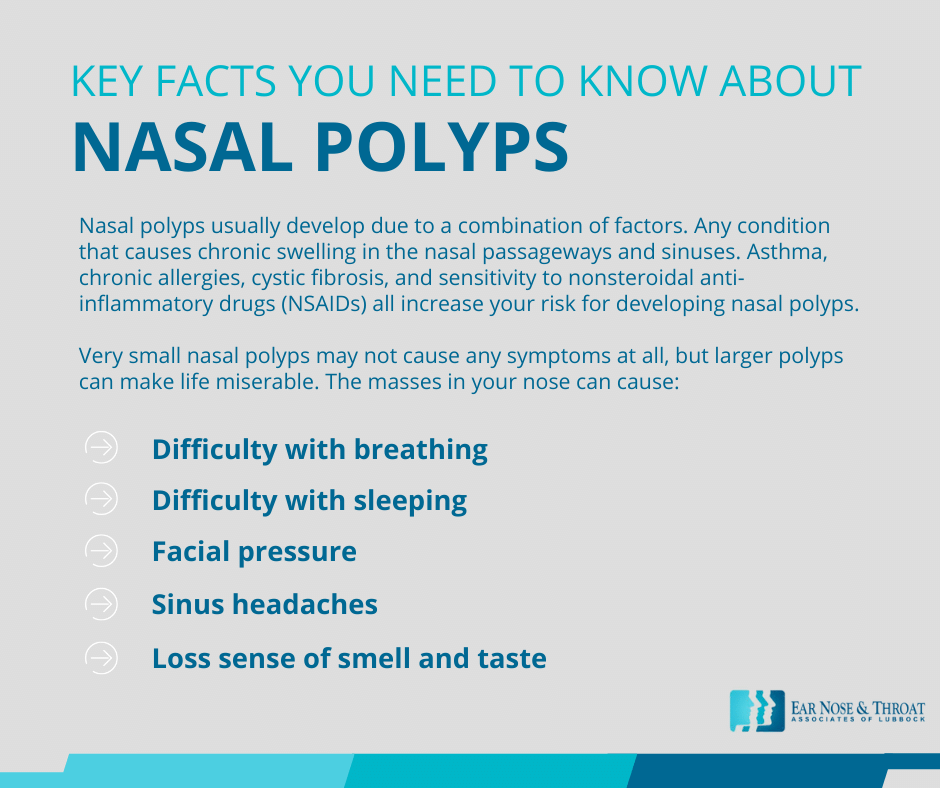Nasal Polyps Removal: Your Treatment Options Explained Simply

Let’s face the facts: life with nasal polyps is miserable.
You’re constantly congested. You have frequent sinus headaches and constant facial pressure. You can’t breathe properly through your nose (and so your mouth is dry on top of everything else).
You may not even be able to smell your food anymore. It’s all the misery that comes along with a cold… but without the hope that your symptoms will resolve in a week or two.
Is there anything you can do about your nasal polyps? What is nasal polyps surgery, and what’s the outlook if you decide on nasal polyps removal?
What Are Nasal Polyps?
Nasal polyps are noncancerous, inflamed tissues that arise from the mucus membranes. These swollen masses filled with fluid can look almost like bloated grapes.
Nasal polyps physically block the flow of air through the nose. They can form in the nasal passageways or further back, in the sinuses.
What Causes Nasal Polyps?
Nasal polyps usually develop due to a combination of factors, including any condition that causes chronic swelling in the nasal passageways and sinuses. Asthma, chronic allergies, cystic fibrosis, and sensitivity to nonsteroidal anti-inflammatory drugs (NSAIDs) all increase your risk for developing nasal polyps.
Additionally, a chronic condition called Samter’s triad includes nasal polyps as one of its key symptoms, along with asthma and aspirin sensitivity. People with Samter’s triad often develop recurring nasal polyps.
Symptoms of Nasal Polyps
Very small nasal polyps may not cause any symptoms at all, but larger polyps can make life miserable. The masses in your nose can cause difficulty with breathing and, therefore, sleeping.
Like any swelling in the nose and sinuses, nasal polyps can cause facial pressure and sinus headaches. Many people with nasal polyps even lose their sense of smell and taste.

Treatment Options for Nasal Polyps Removal
Nasal polyps removal is a lot like pulling weeds; you have to get them out at the root. If the polyps are lower down in the nose, you may have luck treating them at home.
Sometimes, though, the nasal polyps start in the sinuses. In these cases, an ENT surgeon will need to surgically remove the polyps at their origin point.
Nonsurgical Treatment Options for Nasal Polyps
When nasal polyps are mild, you can try treating them at home with an over-the-counter nasal antihistamine or topical steroid spray such as Flonase. Steam inhalation and saline sinus rinses (like a neti pot) may also help to decrease symptoms.
People who may have Samter’s triad should avoid aspirin or other NSAIDs so they don’t exacerbate their symptoms.
Sometimes simply better controlling your allergies or asthma can lead to a decrease in nasal polyps.
Surgery for Nasal Polyps Removal
When nasal polyps interfere too much with your daily life and your breathing, it may be time to consider endoscopic sinus surgery to remove them. Endoscopic sinus surgery is an outpatient procedure performed under general anesthesia.
Endoscopic sinus surgery doesn’t leave any external scarring because it’s performed through the nose. The surgeon inserts a scope with a tiny camera through your nostril and back into your sinus cavities. They then remove the polyps that are restricting your airflow.
Often your surgeon will prescribe a nasal spray for use after your surgery to prevent the nasal polyps from returning.
What’s the Outlook After Nasal Polyps Surgery?
The outlook for patients after nasal polyps removal is excellent! The goal of nasal polyps removal is to help you feel better, and in the vast majority of cases, that’s exactly what happens.
Many patients regain their sense of smell and taste (although it’s not guaranteed). Most patients’ breathing improves and they experience less congestion, less facial pressure, and better sleep after the surgery.
For some patients who fail to control their polyp regrowth with medications and surgery, new biologic medications, like Dupixent®, are showing great promise. Dupixent® is a twice-monthly injectable medication that can also benefit patients with asthma and severe dermatitis.
Suffering From Nasal Polyps?
If you’ve had to suffer with nasal polyps for a long time, these results might sound too good to be true. But the physicians at ENT Associates of Lubbock are experienced in treating and removing nasal polyps.
We invite you to contact our office to book a consultation to discuss your treatment options. Our team would love to help you breathe easier and get back to the life you enjoy.
Dr. Scolaro is a board-certified Otolaryngologist servicing the South Plains area. He has been practicing in Lubbock since 1990 and has earned a reputation as a skilled and experienced surgeon. He currently serves as the Medical Director for Covenant High Plains Surgery Center campuses, is a member of Covenant Health Partners and is an adjunct faculty professor for Texas Tech University Health Sciences Center School of Medicine. Learn more about Dr. Scolaro.
Categories:







